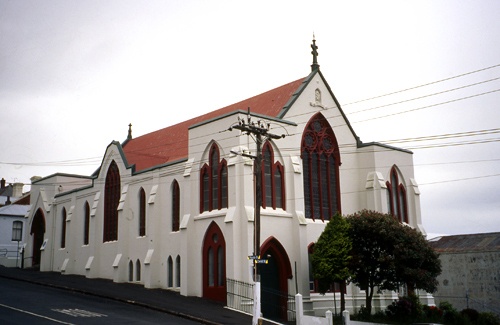
Former St Andrew’s Church (1888)
Denouncing ‘the sin of cheapness’
Dunedin has many magnificent churches. There is Robert Lawson’s First Church; within walking distance you can also find Knox Church (1876) in George Street, and St Paul’s (1919) in the Octagon, while just north of the university is that wonderful polychromatic pile, All Saints (1865). They usually top guides to city architecture. Walk south of the Exchange, however, and trek up Carroll Street (formerly Walker Street) in what used to be the smoky heart of Dunedin’s late Victorian business district and you will find the former St Andrew’s Church. This brick, crenellated building, cement plastered early in its life, is not Lawson’s best and most people pay more attention to the nearby former Sunday School. The former Historic Places Trust gave the 600-seat church its lowliest rating, the old D (which, critics allege, stood for ‘[Record and] Demolish’), but it deserves better, because it was here that on 30 September 1888 the Reverend Rutherford Waddell preached ‘what was to prove the most influential sermon in New Zealand history’.
Who was Waddell? Not much to look at. He had a slight speech impediment, but this small Ulsterman of Scots-Irish parentage blazed like the burning bush symbol in this church’s gable. In 1879 Waddell accepted the call to St Andrew’s Presbyterians. Reverend Adam Glasgow had started preaching in the notorious ‘Devil’s Half Acre’ from a tent chapel in November 1881, opening a more permanent building in May 1882 and then this one in 1870. Then a flourishing mixed inner-city congregation of rich and poor Presbyterians, St Andrew’s took to the industrious Christian socialist. Waddell involved himself in many civic affairs but as the ‘Long Depression’ of the 1880s bit deeper, he responded with practical church-based initiatives. He opened a mission hall in 1888, set up a savings bank, opened a free library and developed sporting and self-improvement clubs on top of supporting overseas missions. In 1889, with his encouragement, suffragists Lavinia Kelsey and Rachel Reynolds opened New Zealand’s first free kindergarten in the church hall. But Waddell made his biggest splash by denouncing ‘the sin of cheapness’, the cost-cutting by manufacturers and middlemen that was producing sweated labour. The curse fell particularly heavily on women and boys in the garment and footwear trades, where they put in 72-hour weeks in dirty, dangerous plants for nine shillings. Outworkers fared even worse; Waddell found that one woman got just twopence for finishing a pair of trousers.
The sermon inspired George Fenwick, editor of the Otago Daily Times, to investigate. Soon Fenwick’s reporters were rattling teacups up and down colony. Conservative politicians, sensitive to charges that Old World evils were emerging in ‘Better Britain’, responded by setting up a Royal Commission. Its majority report denied that ‘sweating’ existed in this antipodean Garden of Eden, but demanded a comprehensive new Factory Act and other sweeping reforms, Waddell’s minority report declared that sweating was here. By then he was serving as president of a widely supported Tailoresses’ Union. The unions lost the 1890 Maritime Strike but the issues raised by Waddell significantly influenced the 1890 general election and the legislative programme of the new Liberal government that would rule for the next 21 years.
The preacher retired in 1919 after 40 years at St Andrew’s. He died in Dunedin in 1932. A plaque on the building commemorates the man who preached New Zealand’s most influential sermon. You can see some of the fittings from the church, which amalgamated with First Church in 1978, in the latter’s east transept. In more recent times, the old church has been used by the Word of Life Pentecostals and since 2001 the Coptic Orthodox Church.
Further information
This site is item number 65 on the History of New Zealand in 100 Places list.
Websites
- Heritage New Zealand List entry
- Presbyterian Church - Te Ara
- Clothing and footware manufacture - Te Ara
- Robert Lawson biography - Te Ara
- Rutherford Waddell biography - Te Ara
- Dunedin's city churches heritage trail (PDF)
Books
- J. Collie, Rutherford Waddell, A.H. Reed, Dunedin, 1932
- Charles Croot, Dunedin churches past and present, Otago Settlers’ Association, Dunedin, 1999



Community contributions